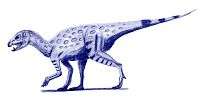Clarens Formation
| Stratigraphy of the Karoo Supergroup in the Karoo Basin | ||||
|---|---|---|---|---|
| Period | Group | Formation west of 24°E | Formation east of 24°E | Assemblage Zone |
| Jurassic | Drakensberg | Hiatus | Drakensberg | |
| Stormberg | Clarens | |||
| Triassic | Elliot | |||
| Molteno | ||||
| Beaufort | ||||
| Burgersdorp | Cynognathus | |||
| Katberg | Lystrosaurus | |||
| Balfour | ||||
| Permian | Dicynodon | |||
| Teekloof | ||||
| Cistecephalus | ||||
| Middleton | ||||
| Tropidostoma | ||||
| Pristerognathus | ||||
| Abrahams-Kraal | Koonap | |||
| Tapinocephalus | ||||
| Eodicynodon | ||||
| Ecca | Waterford | Waterford | ||
| Tierberg / Fort Brown | Fort Brown | |||
| Laingsburg / Ripon | Ripon | |||
| Collingham | Collingham | |||
| White Hill | White Hill | |||
| Prince Albert | Prince Albert | |||
| Carboniferous | Dwyka | Elandsvlei | Elandsvlei | |
The Clarens Formation is a lower Jurassic stratigraphic unit, forming the uppermost part of the Stormberg Group of the Karoo Supergroup in south-central Africa.[3] It is well known for its fossil fauna, particularly in the Tuli Basin of the KwaZulu-Natal region of South Africa.
Lithology
This formation represents the last record of sedimentary deposition of the Karoo Supergroup (although the upper part of the Clarens Formation and the lower part of the Drakensberg Formation appear to interleave). The majority of the sediments are fine-grained aeolian sand (either massive loess or large-scale cross-bedded dunes), with occasional playa lake, sheet flood and short-lived river deposits in places.[4] The sand is generally well-sorted and numerous large-scale cross-bedded dunes are visible. Palaeowind directions are to the south-east.
Fauna of the Clarens Formation
Bony fish
| Bony fishes of the Clarens Formation | ||||||
|---|---|---|---|---|---|---|
| Genus | Species | Location | Stratigraphic position | Material | Notes | Images |
|
S. capensis |
Semionotus ("Flag-Back") is an extinct genus of ray-finned fish found throughout Northern Pangaea (North America and Europe) during the late Triassic, becoming extinct at the start of the Jurassic. |
| ||||
Insects
Termites are known from this formation
Dinosaurs
Unidentified dinosaur eggs have been recovered from the formation.[5]
Color key
|
Notes Uncertain or tentative taxa are in small text; |
| Dinosaurs of the Clarens Formation | ||||||
|---|---|---|---|---|---|---|
| Genus | Species | Province | Stratigraphic position | Material | Notes | Images |
|
Indeterminate[6] |
|
|||||
|
G. atavus[7] |
||||||
|
H. tucki[7] |
||||||
|
M. carinatus[7] |
||||||
|
T. dubius[6] |
|
|||||
|
T. minor[6] |
|
|||||
Synapsids
| Synapsids of the Clarens Formation | ||||||
|---|---|---|---|---|---|---|
| Genus | Species | Location | Stratigraphic position | Material | Notes | Images |
|
P. monus |
| |||||
|
T. maximus |
Tritylodon was a species of tritylodont, one of the most advanced group of cynodonts. It was small in size and had an herbivorous diet, something of an anomaly among the mostly carnivorous cynodonts. Tritylodon had many features of modern mammals, but was egg-laying. | |||||
See also
Footnotes
- ↑ Rubidge, B.S. (2005). "Re-uniting lost continents – Fossil reptiles from the ancient Karoo and their wanderlust". South African Journal of Geology. 108 (1): 135–172. doi:10.2113/108.1.135.
- ↑ Selden, P.; and Nudds, J. (2011). "Karoo". Evolution of Fossil Ecosystems (2 ed.). Manson Publishing. pp. 104–122. ISBN 9781840761603.
- ↑ Catuneanu O.; Wopfner H.; Eriksson P.G.; Cairncross B.; Rubidge B.S.; Smith R.M.H.; Hancox P.J. (2005). "The Karoo basins of south-central Africa". Journal of African Earth Sciences. 43 (1-3): 211–253. doi:10.1016/j.jafrearsci.2005.07.007.
- ↑ Johnson, MR; van Vuuren, CJ; Hegenberger, WF; Key, R; Shoko, U (1996). "Stratigraphy of the Karoo Supergroup in southern Africa: an overview". Journal of African Earth Science. 21 (1): 3–15.
- ↑ Weishampel, David B; et al (2004). "Dinosaur distribution (Early Jurassic, Africa)." In: Weishampel, David B.; Dodson, Peter; and Osmólska, Halszka (eds.): The Dinosauria, 2nd, Berkeley: University of California Press. Pp. 535–536. ISBN 0-520-24209-2.
- 1 2 3 4 5 6 7 8 9 10 11 "81.2 Free State Province, South Africa; 2. Clarens Formation," in Weishampel, et al. (2004). Page 536.
- 1 2 3 4 5 6 "81.2 Free State Province, South Africa; 2. Clarens Formation" and "81.3 Cape Province, South Africa; 2. Clarens Formation," in Weishampel, et al. (2004). Page 536.
- 1 2 3 "81.3 Cape Province, South Africa; 2. Clarens Formation," in Weishampel, et al. (2004). Page 536.
References
- P. Ellenberger. 1970. Les niveaux paléontologiques de première apparition des mammifères primoridaux en Afrique du Sud et leur ichnologie. Establissement de zones stratigraphiques detaillees dans le Stormberg du Lesotho (Afrique du Sud) (Trias Supérieur à Jurassique) The paleontological levels of the first appearance of primordial mammals in southern Africa and their ichnology. Establishment of detailed stratigraphic zones in the Stormberg of Lesotho (southern Africa) (Upper Triassic to Jurassic). In: S. H. Haughton (ed.), Second Symposium on Gondwana Stratigraphy and Paleontology, International Union of Geological Sciences. Council for Scientific and Industrial Research, Pretoria 343-370
- S.H. Haughton, 1924, "The fauna and stratigraphy of the Stormberg Series", Annals of the South African Museum 12 : 323-497
- Kitching, J.W., and Raath, M.A. 1984. Fossils from the Elliot and Clarens Formations (Karoo Sequence) of the northeastern Cape, Orange Free State and Lesotho, and a suggested biozonation based on Tetrapods. Palaeontologia Africana, 25:111-125.
- Olsen, P.E., and Galton, P.M. 1984. A review of the reptile and amphibian assemblages from the Stormberg Group of southern Africa with special emphasis on the footprints and the age of the Stormberg. Palaeontologia Africana, 25:87-110.
- Weishampel, David B.; Dodson, Peter; and Osmólska, Halszka (eds.): The Dinosauria, 2nd, Berkeley: University of California Press. 861 pp. ISBN 0-520-24209-2.



